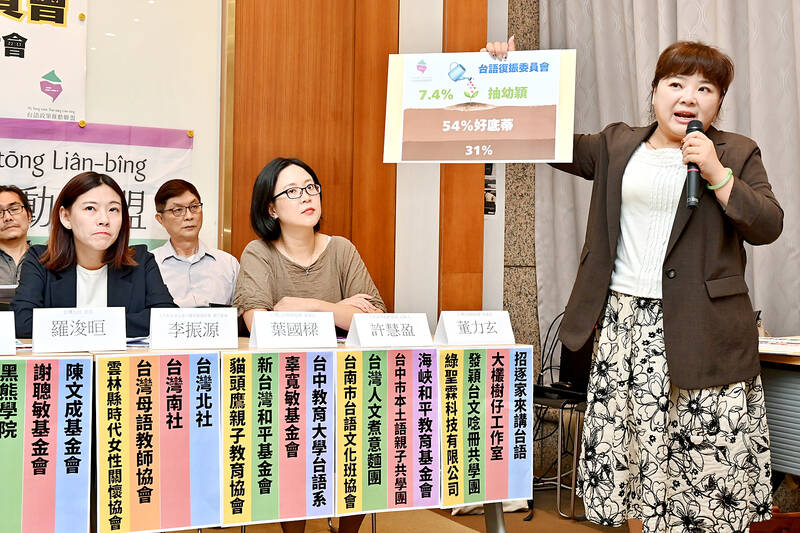Language rights advocates, including Democratic Progressive Party (DPP) politicians, yesterday called for the establishment of a dedicated body to revive Hoklo (commonly known as Taiwanese), and urged the government to formulate a complete set of policies to promote the language.
Taiwan is facing a serious crisis, as “the loss of habitat for languages” has led to younger people having fewer opportunities to hear and speak their mother tongue, the Taigi Policy Promotion Alliance told a news conference at the Legislative Yuan in Taipei.
The group said the central government should establish a new body, which it called the “Hoklo Revitalization Council,” similar to the government councils dedicated to rejuvenating Hakka and indigenous languages.

Photo: George Tsorng, Taipei Times
“Hoklo was in the past the main medium of communication between ethnic groups in Taiwan. However, the use of Hoklo and the opportunities to speak it have dwindled so much that many are concerned that it would disappear,” alliance representative Hsu Hui-ying (許慧盈) said.
Koo Kwang-ming Foundation executive director Yang Zong-li (楊宗澧) said it was the result of the Chinese Nationalist Party (KMT) government’s suppression of all aspects of Taiwanese culture during the Martial Law era, and its push to make Mandarin Chinese the dominant language, while sidelining other languages such as Hoklo, Hakka and indigenous languages.
“People whose mother tongue is Hoklo should encourage its use in society and everyday life. However, nowadays, Mandarin prevails in the workplace, professional settings, the media and the public sector,” he said.
“Take as an example the recent discovery of African swine fever at a Taichung farm. Most veterinarians received their training in Mandarin, which is what they use at work, but most hog farmers speak Hoklo. This language gap creates problems in communication,” Yang said.
“We urgently need to revitalize Hoklo,” because it is the mother tongue of the majority of people in Taiwan, DPP Legislator Lin Chun-hsien (林俊憲) said. “It is also the soul of Taiwanese culture, the repository of Taiwanese history and our collective memory.”
While a recent government survey showed that Hoklo speakers are still the majority, the use of Hoklo in daily life has rapidly declined, he said.
Among people aged 65 or older, more than 70 percent can speak Hoklo, but that percentage is only 7.4 percent among young people, he said.
“There exists a generation gap ... but the government has been slow in responding to this situation,” he added.
“Instead of chanting slogans, the government must set up a Hoklo revitialization council because we need a comprehensive policy reform, with all ministries collaborating from top to bottom to promote Hoklo,” he said.
“Hoklo is now classified as an endangered language according to the standards of UNESCO,” Lin said. “I have repeatedly urged the government to take action to stop the decline of Taiwan’s mother tongue, to set up a dedicated body and build a Hoklo culture park to promote the language’s use in our daily lives and in society.”

The manufacture of the remaining 28 M1A2T Abrams tanks Taiwan purchased from the US has recently been completed, and they are expected to be delivered within the next one to two months, a source said yesterday. The Ministry of National Defense is arranging cargo ships to transport the tanks to Taiwan as soon as possible, said the source, who is familiar with the matter. The estimated arrival time ranges from late this month to early next month, the source said. The 28 Abrams tanks make up the third and final batch of a total of 108 tanks, valued at about NT$40.5 billion

Two Taiwanese prosecutors were questioned by Chinese security personnel at their hotel during a trip to China’s Henan Province this month, the Mainland Affairs Council (MAC) said yesterday. The officers had personal information on the prosecutors, including “when they were assigned to their posts, their work locations and job titles,” MAC Deputy Minister and spokesman Liang Wen-chieh (梁文傑) said. On top of asking about their agencies and positions, the officers also questioned the prosecutors about the Cross-Strait Joint Crime-Fighting and Judicial Mutual Assistance Agreement, a pact that serves as the framework for Taiwan-China cooperation on combating crime and providing judicial assistance, Liang

A group from the Taiwanese Designers in Australia association yesterday represented Taiwan at the Midsumma Pride March in Melbourne. The march, held in the St. Kilda suburb, is the city’s largest LGBTQIA+ parade and the flagship event of the annual Midsumma Festival. It attracted more than 45,000 spectators who supported the 400 groups and 10,000 marchers that participated this year, the association said. Taiwanese Designers said they organized a team to march for Taiwan this year, joining politicians, government agencies, professionals and community organizations in showing support for LGBTQIA+ people and diverse communities. As the first country in Asia to legalize same-sex

MOTIVES QUESTIONED The PLA considers Xi’s policies toward Taiwan to be driven by personal considerations rather than military assessment, the Epoch Times reports Chinese President Xi Jinping’s (習近平) latest purge of the Chinese People’s Liberation Army (PLA) leadership might have been prompted by the military’s opposition to plans of invading Taiwan, the Epoch Times said. The Chinese military opposes waging war against Taiwan by a large consensus, putting it at odds with Xi’s vision, the Falun Gong-affiliated daily said in a report on Thursday, citing anonymous sources with insight into the PLA’s inner workings. The opposition is not the opinion of a few generals, but a widely shared view among the PLA cadre, the Epoch Times cited them as saying. “Chinese forces know full well that